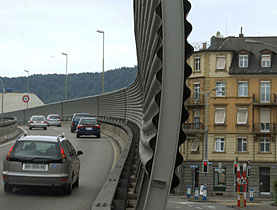
Time for noise polluters to pay for damage

Campaigners have called on the authorities to make road and rail noise polluters pay for the damage they cause.
In an effort to draw attention to the widespread but largely hidden problem of noise pollution, a host of organisations have joined forces to mark International Noise Awareness Day on Wednesday.
The complex effects of noise pollution are not immediately obvious. Indirect costs, such as the loss in property value and health-related costs far outweigh the direct costs such as the building of noise reduction structures.
Rudolf Muggli, president of the Federal Committee Against Noise Pollution, told swissinfo that those who were causing noise pollution were often unaware of the negative side effects of their actions.
“Most people think the noise they make has no effect but that is wrong. People should take into consideration the noise they are making and think of the cost.”
Whether that cost is lower rent for the landlord of an apartment building beside a motorway or poor concentration at work suffered by the tenant who is unable to sleep peacefully, the problem is caused by the collective behaviour of others.
“It is individuals who cause noise through their lifestyle choices,” Muggli claims. “It is possible to drive a less noisy car, just as it is possible to drive a loud car noisily.”
Noise tax
The committee is looking into ways in which people could be discouraged from making nuisance noise. One possibility is a tax for more noisy cars. “It doesn’t have to be complicated but people have to start taking responsibility for the noise they make,” Muggli said.
An estimated 500,000 people are exposed in their homes to excessive noise from roads and 260,000 people to excessive noise from railways.
A further 50,000 people are equally affected by aircraft noise, according to Irène Schlachter of the Federal Environment Office.
Noise pollution from road and rail costs Switzerland an estimated SFr1 billion ($1,000,800) per year, mainly in the form of decreased rental value and healthcosts.
The effects of industry noise, aircraft noise and the impact on tourist amenities have not yet been calculated in monetary terms.
“There is a lot more that can be done technically to make vehicles and trains quieter but it is not yet enough of a priority for the public. Noise is what other people make; people are often not aware of the noise they cause themselves,” Schlachter told swissinfo.
Muggli’s committee has called on the state and the cantons to see to it that the principle of polluter pays is implemented in a consistent way.
“The costs of noise pollution should be as far as possible borne by the originator of the noise because that is the only way they will have an interest in preventing it,” a committee statement said.
Muggli also points out that noise pollution is also a social problem. “It costs money to live in a quiet area and therefore it is a fact that poor people have to put up with more noise.”
Stress
According to Peter Kälin of the organisation Doctors for the Environment, long-term exposure to noise pollution has a negative impact on various everyday activities like sleep, rest and communication.
“It makes it difficult for people to perform and concentrate and over time it can affect psychological wellbeing.”
Apart from the psychological effects, there are physical effects of exposure to excessive noise which can happen even when even when people are not aware of the noise they are exposed to.
“The body experiences a stress reaction, producing certain stress hormones and blood pressure also goes up. In extreme cases it can lead to a heart attack or other heart problems,” Kälin explained.
“In environment surveys people often put noise among the top pollution problems. It is an important topic for our organisation because it’s not taken seriously enough by society or politics,” he added.
Exposure to high noise levels has been shown to lead to a range of physical symptoms such as accelerated heartbeat, high blood pressure and chronic fatigue.
Some of these problems are relatively easy to treat medically, but other psychological effects such as insomnia, nervousness, anxiety and depression can be longer lasting.
Noise pollution from road and rail transport costs Switzerland an estimated SFr998 million per year – SFr140 per head.
Depreciation of property accounts for about 90%, while 10% goes towards health costs.
Causes of noise pollution in Switzerland:
Road traffic
Rail traffic
Aircraft noise
Industry noise
Building noise
Firing ranges
Concerts
Neighbours
Bells
When voters in Zurich had an opportunity to vote on noise pollution last November they adopted a pragmatic approach, rejecting an initiative to limit flight movements at Switzerland’s biggest airport.
The initiative to limit flight movements to 250,000 a year and extending a night ban at Zurich airport was supported by residents living under the flight paths who said their quality of life was damaged by air traffic.
Although they lost at the ballot box, residents had better luck in court in February. A homeowner who brought the first in a series of noise pollution court cases against Zurich airport was awarded SFr170,000 compensation.

In compliance with the JTI standards
More: SWI swissinfo.ch certified by the Journalism Trust Initiative



























You can find an overview of ongoing debates with our journalists here . Please join us!
If you want to start a conversation about a topic raised in this article or want to report factual errors, email us at english@swissinfo.ch.